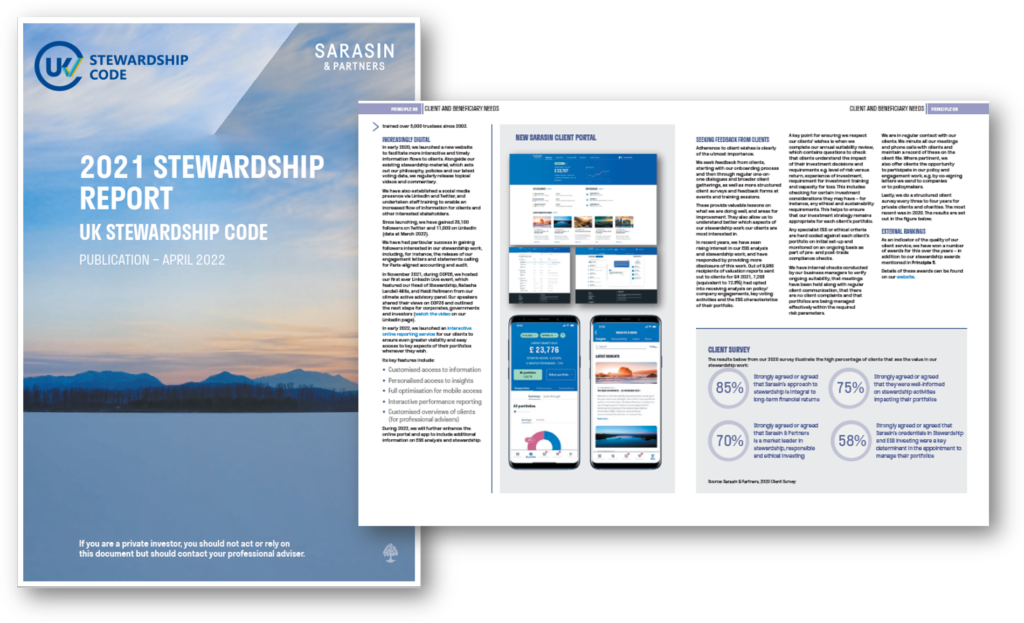Sarasin becomes a signatory to the UK Stewardship Code for second year running
For the second time in a row, Sarasin & Partners is pleased to have been accepted as a signatory to the UK Stewardship Code. The UK Financial Reporting Council (FRC) publishes an annual list of investor signatories.
This year, 236 signatories – two thirds of applicants – were accepted, following the submission of 2021 annual stewardship reports. The FRC selects signatories by examining their adherence to the 12 principles of the UK Stewardship Code. Read our report here
Sarasin receives top scores In 2021 PRI Assessment
As a signatory to the United Nations Principles of Responsible Investment, we are assessed annually on our adherence to the six Principles. Sarasin & Partners was awarded the top score for seven out of the eight modules assessed. We are delighted to have been recognised for our commitment to stewardship, and will continue to work on maintaining and improving our record.
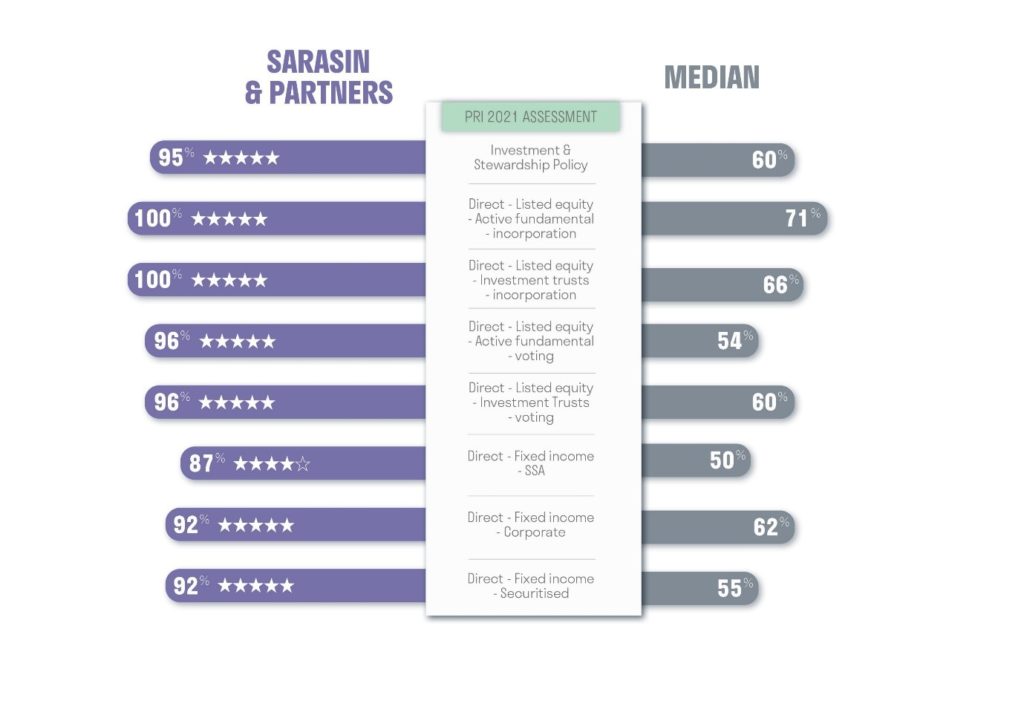
A Net-Zero voting policy for 2023
Sarasin & Partners has implemented a net-zero voting policy since 2018. We are routinely in the minority when we vote against directors or auditors on climate grounds. In the face of the accelerating climate crisis, we ask fellow investors to come together to send a clear message as company shareholders that companies must:
- Make public and credible commitments to align all financing activities with achieving the Paris Agreement goals
- Provide meaningful short and medium-term targets for phasing out financing of carbon-intensive activities across all sectors
- Report on progress in achieving these targets
In September this year, we published a standalone Net Zero Voting Policy to outline how we align our voting policies with achieving a net zero by 2050 outcome, in line with our Net Zero Asset Managers (NZAM) commitment.
We apply our net zero voting policy to companies on our Climate Amber list – those whose future prospects are most materially exposed to climate change and the energy transition. Directors should ensure that their company strategy is aligned with a net-zero outcome and disclose all material climate risks – whether related to the effects of climate change or to the energy transition. Those that fail to manage these risks should be held to account. Financial statements should reflect the material impacts of climate risk to a company’s financial outlook. Shareholders rely on the auditor to alert them to potentially misleading financial statements. Where climate risks are likely to alter a company’s economic prospects, the auditor should check that all key accounting assumptions and judgements remain reliable. Auditors that fail to do this should be replaced. Where remuneration is awarded for performance that makes climate change worse, we should reject it.
In our Net Zero Voting Policy, we set out how climate considerations are embedded into our voting on core items such as financial statements, auditor reappointment and remuneration, and, particularly, director elections. We call on our peers, and particularly signatories to the NZAM commitment, to ensure their voting reflects this commitment.
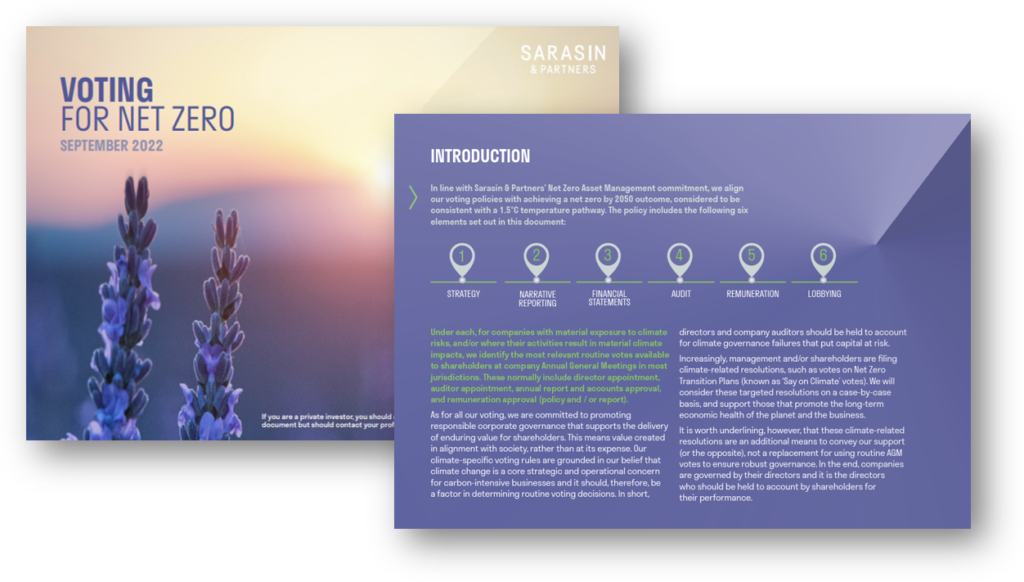
Please see the chart below for climate-related votes implemented in 2022.
Climate-related voting in 2022: Number and percentage of Amber List companies where climate was a key driver of against/abstain vote
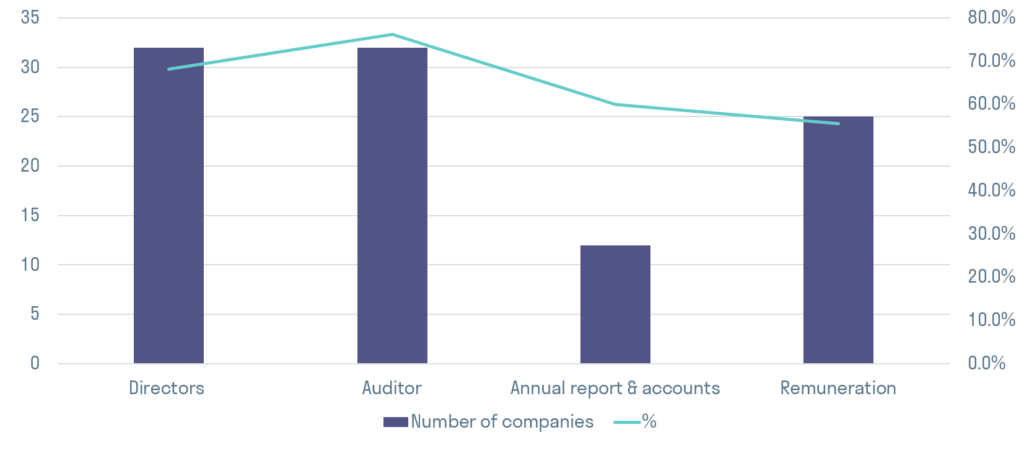
Collective action: 30% club uk investor race equity working group
The 30% Club UK Investor Group was established in 2011 and brings together more than 40 investors with £11.7tn AUM in order to drive change on inclusion and diversity.
In 2022, we assumed leadership of the newly created 30% Club’s UK Investor Race Equity Working Group. We lead the investor workstream to press companies to achieve the 30% Club’s targets for representation of women of colour in senior executive and board roles in UK listed companies, as well as the Parker Review recommendations for ethnic diversity on FTSE Boards.
Following the launch of the 30% Club’s Investor Statement on addressing Racial Inequality and Call to Action[1] in March, which we were instrumental in drafting, we now lead the collective outreach with FTSE companies to satisfy the Statement’s asks.
As FTSE 100 companies now largely satisfy the Parker Review, we have turned our attention to FTSE 250 companies, even though they have until 2024 to meet the Parker Review guidelines. We want to see faster action – specifically the appointment of at least one ethnic minority director by the end of 2023 - in line with the 30% Club’s targets.
Our focus is on those FTSE 250 companies that do not meet the Parker Review recommendations, based on the most recent update report as of March 2022[2].
| FTSE 250 companies already meeting the target (as of December 2021) | |
|---|---|
| Companies already meeting target | 128 |
| Companies not yet meeting target | 105 |
| Companies not responding | 17 |
| % Met* | 55% |
Source: Improving the Ethnic Diversity of UK Boards – An update report from the Parker Review March 2022.*Base: Responding Companies
To prioritise engagements, we stripped out the investment trusts and REITs from this list, as well as companies who were not surveyed by this update, due to being newly listed in the FTSE 250. The final target list totals 71 names, which we have split into three phases based on market capitalisation, and intend to contact over the longer term.
This quarter, we launched Phase 1, comprising 24 companies. Letters have been sent to the Chairs of all of these companies, with each member of the working group taking ownership of specific companies.
As can be seen by the progress highlighted below, even at this early stage the outlook appears positive, and we expect to see further improvements in the coming months.
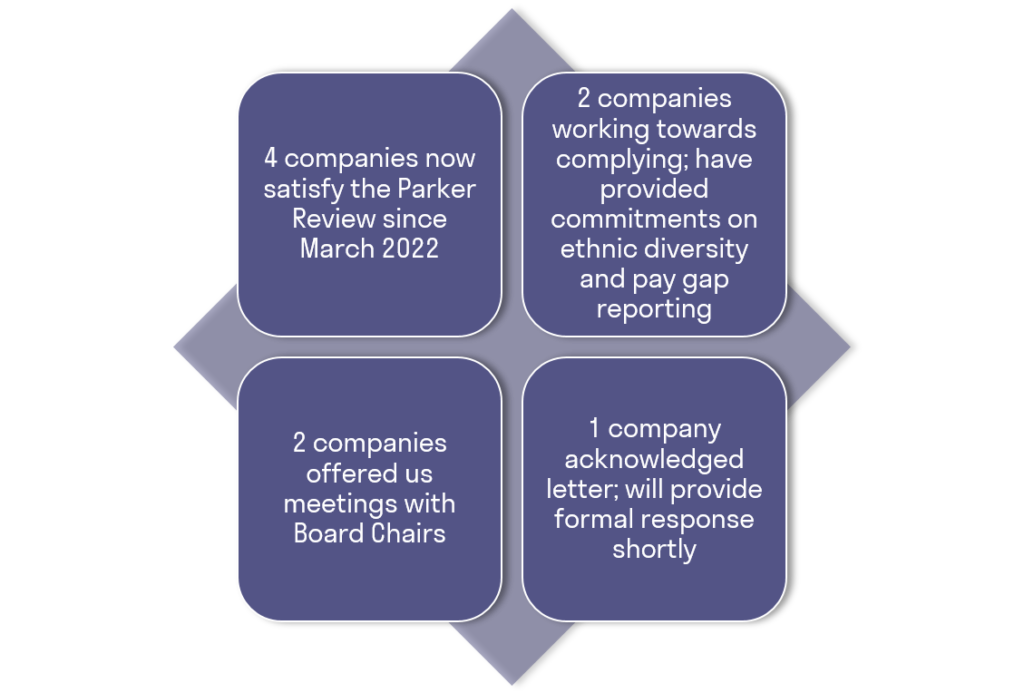
[1] https://30percentclub.org/wp-content/uploads/2022/03/30-Club-Race-Equity-Investor-Statement-1.pdf
[2] https://assets.ey.com/content/dam/ey-sites/ey-com/en_uk/topics/diversity/ey-what-the-parker-review-tells-us-about-boardroom-diversity.pdf
Important information
All details in this content are provided for information purposes only and should not be misinterpreted as investment advice or taxation advice.
This content has been issued by Sarasin & Partners LLP which is a limited liability partnership registered in England and Wales with registered number OC329859 and is authorised and regulated by the UK Financial Conduct Authority. It has been prepared solely for information purposes and is not a solicitation, or an offer to buy or sell any security. The information on which the content is based has been obtained from sources that we believe to be reliable, and in good faith, but we have not independently verified such information and we make no representation or warranty, express or implied, as to their accuracy. All expressions of opinion are subject to change without notice.
Please note that the prices of shares and the income from them can fall as well as rise and you may not get back the amount originally invested. This can be as a result of market movements and also of variations in the exchange rates between currencies. Past performance is not a guide to future returns and may not be repeated.
Neither Sarasin & Partners LLP nor any other member of the Bank J. Safra Sarasin group accepts any liability or responsibility whatsoever for any consequential loss of any kind arising out of the use of this content or any part of it. The use of this content should not be regarded as a substitute for the exercise by the recipient of his or her own judgment. Sarasin & Partners LLP and/or any person connected with it may act upon or make use of the material referred to herein and/or any of the information upon which it is based, prior to publication of this content. If you are a private investor you should not rely on this content but should contact your professional adviser.
© 2022 Sarasin & Partners LLP – all rights reserved. This content can only be distributed or reproduced with permission from Sarasin & Partners LLP.




